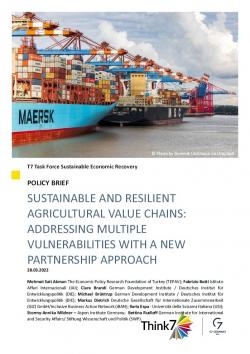Sustainable and Resilient Agricultural Value Chains: Addressing Multiple Vulnerabilities with a new Partnership Approach
The ongoing compound and acute crises of Covid-19 and the war in Ukraine meet longer-term but no-less pressing crises of social and environmental sustainability in and around agriculture, food and nutrition security. At the same time, they irritate existing frames on (and perceptions of) how to address trade and sustainability. External shocks must be increasingly considered when addressing food security, following the FAO’s observation that conflicts and migration have developed into major reasons for food insecurity and hunger. Additionally, climate change, biodiversity loss and human rights are generally most challenging and partially conflicting for many developing countries. They have to address them by aiming at increased and more nutritious food production, job creation, poverty alleviation and resilience to shocks of a still strongly growing and urbanising population. Many international mechanisms are already in place on agriculture and food systems which are almost unavoidably not (yet) sufficiently coordinated. A new generation of due diligence laws recently is added mostly by industrialised countries to that existing mix of policies in place addressing serious sustainability gaps of supply chains into these countries. However, these regulations also bear the risk of generating unintended negative consequences, particularly for smallholder farmers in poor countries. Against this background, we conclude for proposals at different degree of specificity: (1) Reacting to geopolitical risks: Immediate and long-term measures to safeguard food security in light of Russia’s War on Ukraine, (2) Balancing and integrating food security and sustainability, (3) Initiating a joint observatory on new due diligence measures, and (4) Starting a process to improve harmonised global governance for agriculture and food systems.
-
Details
(with Mehmet Sait Akman, Fabrizio Botti, Clara Brandi, Michael Brüntrup, Markus Dietrich, Ilaria Espa, Andreas Freytag, Robert Koopman, Stormy Mildner, Bettina Rudloff) Bonn, German Development Institute, 28 March 2022, 16 p. (Think7 Policy Briefs)
Topic
Tag
Related content
-
Ricerca31/05/2024
Think7 (T7)
leggi tutto



